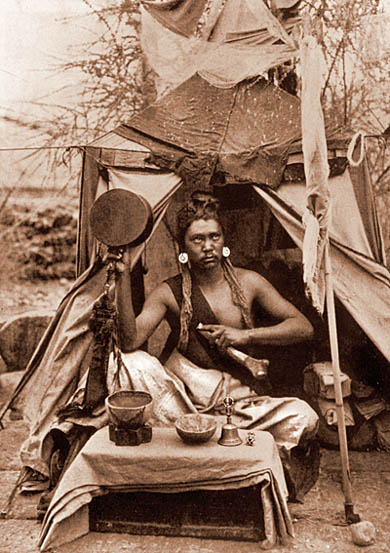
Ngak’phang gÇodpa
Cutting attachment to ‘corporeal form as reference point’
This unknown ngakpa is a gÇodpa – a wandering yogi who practices gÇod in charnel grounds, graveyards, and other places known to arouse fear. gÇod, pronounced ‘chö’, means ‘cutting’. It is the rite of cutting attachment to the corporeal form through making an offering of one’s body to any being who wishes to devour it. The offering is made through the process of visualisation in which one arises as Tröma Nakmo (the black wrathful mother) in the sky above one’s head. One then visualises oneself cleaving away the top of one’s head to make a mystical bone cauldron in which one cooks one’s dismembered body. One offers this ‘feast’ in various forms, and at various times of the day and night, in order to repay one’s ‘karmic debts’ accrued over æons. This is a wrathful practice and one which is not lightly undertaken. gÇodpas and gÇodmas develop great power to alleviate illness through their practice and are often asked to come and practice in areas where their have been epidemics. They are also requested to take the bodies of the deceased into the mountains and to perform the necessities of air-burial for them. A gÇodpa or gÇodma vows never to refuse such a request. The ngak’phang gÇodpa in this photograph is wearing the white shamthab of the gö-kar chang-lo’i dé and the gomtag (meditation strap) of the naljorpa. The tousled mats of his hair are bound up on his head in the ralpa style in which matted strands of hair are also left to hang loose down his shoulders. He wears the ngak’phang conch shell earrings (see link to close-up) which symbolise the trak-tung (khrag ’thung – Skt Heruka) the ‘blood drinking’ wrathful yidams. In the foreground stands his khatvangha trident, and in the background stands his three sided gÇod tent. The gÇodpa or gÇodma travels from place to place practising gÇod and being of benefit to those they meet. In the tent one can see gÇod texts and on the chog-tsé table in front of the ngakpa, stand two skull bowls and his bell. He holds his gÇod drum and thighbone trumpet – the primary ritual tools of gÇod.
